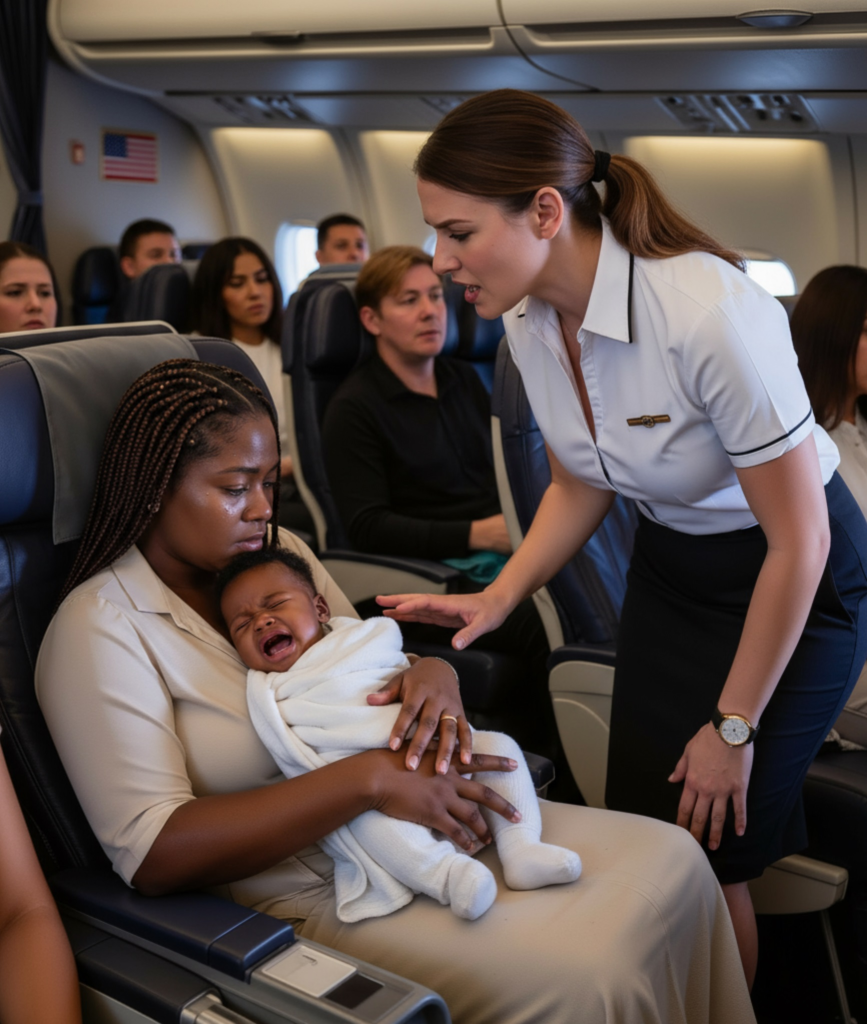The baby’s cries pierced the cabin like tiny thunderclaps.
Heads turned. Eyes rolled. Passengers sighed, tugging at headphones or muttering complaints.
Maya Parker clutched her five-month-old son, Noah, against her chest. It was his first flight—and hers since becoming a mother. She had rocked, hummed, and paced the narrow aisle, desperate to soothe him. Nothing worked

Noah’s cries only grew louder—raw, frightened, helpless.
Then came the voice. Sharp. Cold.
“Ma’am, you need to keep your baby quiet,” the flight attendant said, arms crossed. “Other passengers are trying to rest.”
Maya looked up, startled. “I—I’m trying,” she stammered. “He’s just scared. I’ll calm him down.”
The attendant’s tone hardened. “You should’ve thought of that before bringing an infant on a long flight.”
A few people chuckled. Others turned away. Maya’s face burned as tears welled in her eyes. She whispered to Noah, “It’s okay, baby. Mommy’s here.”
The attendant huffed and walked off, muttering something about “inconsiderate parents.”
Maya sat frozen, her heart pounding. Exhaustion pressed down like a weight she couldn’t shake. She wasn’t flying for vacation—she was flying to survive. Six months earlier, her husband had died in a car accident. Now she was moving from Atlanta to Seattle to start again—new job, new city, new life.
But right now, even hope felt far away.
She could feel the judgment burning from every direction.
Then a soft, steady voice came from across the aisle.
“Excuse me,” an older woman said gently. She had silver hair and kind blue eyes. “May I?”
Maya blinked, unsure what she meant.
The woman smiled. “May I hold him for a bit? I used to be a nurse. Babies can sense tension. Sometimes they just need a different heartbeat.”
Maya hesitated, then nodded. She saw something safe in the woman’s eyes—something maternal and kind.
The woman cradled Noah in her arms and began humming an old lullaby. The melody floated through the cabin like a soft wind. Within minutes, Noah’s sobs faded to tiny hiccups. Then silence.
Maya exhaled in disbelief. “Thank you,” she whispered.
The woman smiled. “You’re doing fine, dear. Don’t let anyone make you think otherwise.”
But peace didn’t last long.
The flight attendant returned, still wearing that tight, disapproving look. “Oh, so he can be quiet,” she said with a smirk. “Maybe you should take notes.”
Several passengers shifted uncomfortably. The older woman’s smile vanished.
“Miss,” she said firmly, “I suggest you speak to this young mother with a little more respect.”
The attendant frowned. “Ma’am, I’m just trying to maintain order—”
“No,” the woman interrupted, her tone calm but unyielding. “You’re humiliating a grieving mother who’s doing her best.”
The flight attendant froze. A ripple of silence spread through the cabin.
“I know,” the woman continued softly, “because I lost my daughter and son-in-law in an accident last year. She left behind a baby—just about that little boy’s age.”
The cabin fell still. Even the engines seemed to quiet.
“This mother,” the woman said, gesturing toward Maya, “isn’t being inconsiderate. She’s being human. What she needs right now isn’t judgment—it’s compassion.”
A man from the back spoke up. “She’s right. Babies cry. It’s life.”
A few people nodded. Someone clapped softly. The mood shifted—from irritation to quiet understanding.
The flight attendant’s shoulders dropped. “I… I’ll bring a blanket,” she murmured, before walking away.
Maya sat in stunned silence. The older woman handed Noah back, sleeping peacefully.
“Thank you,” Maya said, voice trembling.
The woman patted her hand. “It’s nothing, dear. You remind me of my daughter. Just remember—you’re stronger than you think.”
They talked softly for the rest of the flight. The woman’s name was Helen Parker. She lived in Seattle and volunteered at a children’s hospital. When the plane landed, Helen insisted on helping with Maya’s bags.
At baggage claim, she asked gently, “Do you have someone picking you up?”
Maya shook her head. “No, just me and Noah.”
Helen smiled. “Then let me give you a ride. My daughter would’ve done the same.”
Maya hesitated, then nodded gratefully.
The drive was quiet—soft music, faint lavender scent, Noah asleep in the backseat. When they reached Maya’s new apartment, Helen helped unload the stroller and suitcase.
Before leaving, she handed Maya a small card.
Helen Parker — Volunteer Coordinator, Seattle Children’s Hospital.
“If you ever need help—or just someone to talk to—call me.”
A week later, Maya did.
Helen invited her to visit the hospital. Surrounded by children and laughter, Maya felt something awaken inside her. She began volunteering on weekends, reading to patients and helping with small tasks. Noah became everyone’s favorite “little helper.”
Months passed. Life slowly rebuilt itself—piece by piece, kindness by kindness.
Then one afternoon, Maya looked up in the hospital lobby and froze.
The flight attendant stood there—wearing a volunteer badge.
Their eyes met. The woman looked nervous, then stepped forward. “You probably don’t remember me,” she said softly.
“Oh, I remember,” Maya replied, her voice gentle.
The woman swallowed. “I wanted to say… I’m sorry. After that flight, I couldn’t stop thinking about what Helen said. She was right. I was judgmental. I’ve been trying to do better ever since.”
Maya smiled. “We all have bad days. What matters is what we learn from them.”
Tears filled the woman’s eyes. “Thank you—for forgiving me.”
Later that day, Maya found Helen in the children’s ward and told her what happened. Helen just smiled.
“You see, dear,” she said, “kindness echoes. Sometimes it starts with a cry—but it always ends with love.”
Maya looked at Noah, giggling as a nurse waved a toy airplane in front of him.
For the first time in a long while, her heart felt light.
That flight had started with tears—
but it carried her, and others, toward healing.